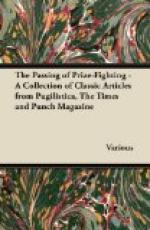The journals may think it somewhat remarkable—we do not at all; for here, as in every other event of the day, a great deal depends upon being “behind the curtain;” and as the greater portion of our life is passed in that locality, we are always to be relied upon for authenticity in our statements. The plain truth is, that the papers were inadvertently lost, and rather than lead to some unpleasant disclosures, in which the eminent professor to whom they were entrusted would have been deeply implicated, it was thought best to say nothing about them. By chance they fell into the hands of the manager of one of our perambulating theatres, who was toiling his way from the west of England to Egham races, and having deposited them in his portable green-room, under the especial custody of the clown, the doctor, and the overbearing parochial authority, he duly remitted them to our office. We have been too happy in giving them a place in our columns, feeling an honest pride in thus taking the lead of the chief scientific publications of the day. It will be seen that they are drawn up as a report, all ready for publication, according to the usual custom of such proceedings, where every one knows beforehand what they are to dispute or agree with.
Dr. Splitnerve communicated a remarkable case of Animal Magnetism:—Eugene Doldrum, aged 21, a young man of bilious and interesting temperament, having been mesmerized, was rendered so keenly magnetic, as to give rise to a most remarkable train of phenomena. On being seated upon a music-stool, he immediately becomes an animated compass, and turns round to the north. Knives and forks at dinner invariably fly towards him, and he is not able to go through any of the squares, in consequence of being attracted firmly to the iron railings. As most of the experiments took place at the North London Hospital, Euston-square was his chief point of attraction, and when he was removed, it was always found necessary to break off the railings and take them away with him. This accounted for the decrepit condition of the fleur de lys that surround the inclosure, which was not, as generally supposed, the work of the university pupils residing in Gower-place. Perfect insensibility to pain supervened at the same time, and his friends took advantage of this circumstance to send him, by way of delicate compliment, to a lying-in lady, in the style of a pedestrian pin-cushion, his cheeks being stuck full of minikin pins, on the right side, forming the words “Health to the Babe,” and on the left, “Happiness to the Mother.”
Dr. Mortar read a talented paper on the cure of strabismus, or squinting, by dividing the muscles of the eye. The patient, a working man, squinted so terribly, that his eyes almost got into one another’s sockets; and at times he was only able to see by looking down the inside of his nose and out at the nostrils. The operation was performed six weeks ago, when, on cutting through the muscles, its effects were instantly visible: both the eyes immediately diverging to the extreme outer angles of their respective orbits.




